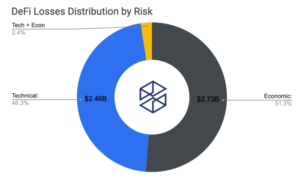
The U.S. Treasury Department wants to crack down on jurisdictional regulatory arbitrage.
The United States Treasury Department believes unregulated stablecoins pose a significant threat to U.S. national security.
Speaking during the Consensus conference on May 29, Brian Nelson, the U.S. Department of the Treasury’s undersecretary for terrorism and financial intelligence, warned that unregulated stablecoins are attracting increasing adoption from North Korean cybercriminals, ransomware operators, and even terrorist organizations.
“We’ve been really focused on the risks around stablecoins,” Nelson said. “We also have observed the increased use of stablecoins, notably Tether’s USDT, by sanctioned persons, scammers, and terrorist groups.”
“All of this emphasizes… how significant a national security risk some of this activity poses to the United States,” Nelson added.
Nelson’s comments come amid increasing efforts on the part of U.S. regulatory agencies and certain Democratic lawmakers to characterize digital assets as a popular instrument for fundraising and sanctions evasion on the part of transnational crime syndicates, terrorist groups, and other nefarious actors.
However, on-chain analytics have repeatedly shown that cryptocurrencies represent a small share of terrorist fundraising relative to other sources, while reports published by the U.S. Treasury Department in February acknowledge that cash remains the dominant instrument used in money laundering activities by far.
“Jurisdictional arbitrage”
Nelson asserted that bad actors are increasingly seeking out digital asset products in jurisdictions with weak anti-money laundering and combating the financing of terrorism (AML/CFT) and sanctions compliance programs.
He asserted that criminals seek to take advantage of jurisdictions with “very little or no regulatory infrastructure around managing illicit finance,” adding that some international virtual asset service providers (VASPs) are “outright failing to meet their compliance obligations.”
To combat these risks, Nelson said the Treasury Department wants to create an authority tasked with preventing U.S.-based financial institutions and persons from engaging with VASPs in jurisdictions lacking meaningful AML/CFT compliance regimes.
He added that the department also wants to work with Congress to mandate that U.S.-backed stablecoins are “subject to OFAC sanctions.”
Crackdown on crypto mixers
Nelson’s comments also come as the U.S. Treasury Department is devoting increasing resources to bringing enforcement actions against crypto-mixing protocols, which are used to bolster transactional privacy on-chain.
In August 2022, the Treasury Department took the unprecedented action of sanctioning Tornado Cash — then the leading Ethereum privacy protocol — by including its smart contracts and associated wallets on the Office of Foreign Assets Control’s (OFAC) list of Specially Designated Nationals.
The action came in response to Lazarus Group, the North Korean state-sponsored hacking organization, using Tornado Cash to obscure the flow of stolen assets.
The department similarly sanctioned the Sinbad.io virtual currency mixer in November and charged the co-founders of the Samourai Wallet mixing service in April.
Privacy vs anonymity
In October, the Treasury’s Financial Crimes Enforcement Network (FinCEN) proposed new regulations requiring U.S.-based VASPs to report transactions that they “know, suspect, or have reason to suspect” involve cryptocurrency mixing services.
Nelson said that the public comment period for the proposed regulations has closed, and that the Treasury Department is currently working on finalizing its rulemaking proposal.
“From our perspective, we believe that there is a difference between obfuscation and anonymity-enhancing services and those that support privacy,” Nelson said. “We totally recognize that in the context of public blockchains that provide information about financial transactions, that there would be a desire to have a certain degree of privacy around those financial transactions.”
Nelson said the department wishes to collaborate with the web3 industry on tools that can enhance privacy while ensuring that U.S.-based entities can adhere to United States law.
“What we see today is that mixers are not designed to provide that privacy, they’re designed to obfuscate the origin, movement, and destination of these assets,” Nelson said. “Mixing entities that are not doing meaningful KYC [or] AML/CFT… in this context, we see North Korean cybercriminals and ransomware actors using mixers to obfuscate the movement of funds… — that creates a significant national security challenge for us.”
“At the end of the day, I would say this is not a ban on mixers, this is a proposed rule designed to drive additional transparency,” Nelson added.
- SEO Powered Content & PR Distribution. Get Amplified Today.
- PlatoData.Network Vertical Generative Ai. Empower Yourself. Access Here.
- PlatoAiStream. Web3 Intelligence. Knowledge Amplified. Access Here.
- PlatoESG. Carbon, CleanTech, Energy, Environment, Solar, Waste Management. Access Here.
- PlatoHealth. Biotech and Clinical Trials Intelligence. Access Here.
- Source: https://thedefiant.io/news/regulation/unregulated-stablecoins-pose-risk-to-national-security-u-s-treasury-department
- :has
- :is
- :not
- 140
- 2022
- 29
- a
- About
- acknowledge
- Action
- actions
- activities
- activity
- actors
- added
- adding
- Additional
- adhere
- Adoption
- ADvantage
- against
- agencies
- also
- Amid
- an
- analytics
- and
- anti-money laundering
- April
- arbitrage
- ARE
- around
- AS
- asserted
- asset
- Assets
- associated
- attracting
- AUGUST
- authority
- Bad
- Ban
- BE
- been
- believe
- believes
- between
- blockchains
- bolster
- Brian
- Bringing
- by
- came
- CAN
- Cash
- certain
- challenge
- characterize
- closed
- co-founders
- collaborate
- combat
- combating
- come
- comment
- comments
- compliance
- Conference
- Congress
- Consensus
- context
- contracts
- crack
- create
- creates
- Crime
- Crimes
- Criminals
- crypto
- cryptocurrency
- Currency
- Currently
- cybercriminals
- day
- Degree
- democratic
- Department
- designated
- designed
- desire
- destination
- difference
- digital
- Digital Asset
- Digital Assets
- doing
- dominant
- down
- drive
- during
- efforts
- end
- enforcement
- engaging
- enhance
- ensuring
- entities
- ethereum
- evasion
- Even
- failing
- far
- February
- finance
- financial
- financial crimes
- Financial Crimes Enforcement Network
- Financial institutions
- Financial Intelligence
- financing
- FinCen
- flow
- focused
- For
- foreign
- from
- Fundraising
- funds
- Group
- Group’s
- hacking
- Have
- How
- HTTPS
- i
- illicit
- in
- Including
- increased
- increasing
- increasingly
- industry
- information
- Infrastructure
- institutions
- instrument
- Intelligence
- International
- involve
- ITS
- jurisdictions
- Korean
- KYC
- lacking
- Laundering
- Law
- Lazarus
- Lazarus Group
- leading
- List
- little
- managing
- mandate
- May..
- meaningful
- Meet
- mixer
- MIXERS
- Mixing
- money
- Money Laundering
- movement
- National
- national security
- network
- New
- no
- North
- notably
- November
- obligations
- october
- of
- OFAC
- Office
- on
- On-Chain
- operators
- or
- organization
- organizations
- origin
- Other
- our
- out
- part
- period
- persons
- perspective
- plato
- Plato Data Intelligence
- PlatoData
- Popular
- pose
- poses
- preventing
- privacy
- Products
- Programs
- proposal
- proposed
- protocol
- protocols
- provide
- providers
- public
- published
- ransomware
- really
- reason
- recognize
- regimes
- regulations
- regulatory
- relative
- remains
- REPEATEDLY
- report
- Resources
- response
- Risk
- risks
- Rule
- s
- Said
- Samourai
- Sanctioned
- Sanctions
- say
- Scammers
- security
- see
- Seek
- seeking
- service
- service providers
- Services
- Share
- shown
- significant
- small
- smart
- Smart Contracts
- some
- Sources
- specially
- Stablecoins
- States
- stolen
- subject
- support
- syndicates
- Take
- Terrorism
- terrorist
- that
- The
- The Defiant
- their
- then
- There.
- These
- they
- this
- those
- threat
- to
- today
- took
- tools
- tornado
- Tornado Cash
- TOTALLY
- transactional
- Transactions
- transnational
- Transparency
- treasury
- Treasury Department
- u.s.
- U.S. Treasury
- u.s. treasury department
- United
- United States
- unprecedented
- unregulated
- us
- USDT
- use
- used
- using
- vasps
- Virtual
- virtual asset
- virtual asset service providers
- virtual asset service providers (VASPs)
- virtual currency
- vs
- Wallet
- Wallets
- wants
- we
- weak
- Web3
- Web3 industry
- webp
- which
- while
- with
- Work
- working
- would
- youtube
- zephyrnet







